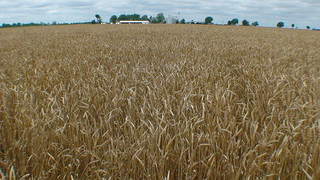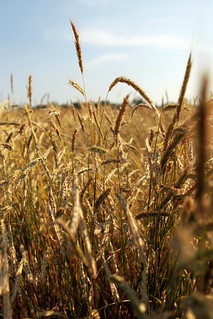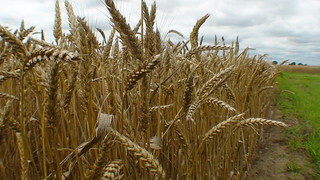Another Arkansas yield record falls, this time in winter wheat
October 1, 2014
Fast facts
- New state yield record set in winter wheat
- NASS puts final yield at 63 bushels per acre, breaking the 2013 record of 62 bushels per acre
- Sharp drop in grain prices may mean sharp drop in 2015 acres
(489 words)
JONESBORO, Ark. -- For the second year straight, Arkansas’ winter wheat farmers have set a state average yield record, getting 63 bushels per acre in 2014, one bushel per acre above the previous record, according to the National Agricultural Statistics Service.
NASS released its annual “Small Grains,” summary on Tuesday. The report showed Arkansas harvested 395,000 acres with total production at 24.89 million bushels -- about 5 percent of the total soft red wheat production in the U.S. Soft red wheat is commonly used in baked goods.
“Considering the year we had, the yield is a pleasant surprise,” Jason Kelley, extension wheat and small grains agronomist for the University of Arkansas System Division of Agriculture, said on Wednesday. “It was a challenging year, especially at harvest time, with all the rainfall just prior to and during the harvest.”
Decisions for 2015
Winter wheat planting is in its early stages, with just 2 percent planted, and will be harvested next June. Now is the time growers are making decisions about next year’s crop. It’s during these commodity cusps that the phones begin ringing in Kelley’s and Scott Stiles’ offices. Stiles is an extension economist for the Division of Agriculture.
Both said that despite the big yield numbers, there is much uncertainty among farmers where wheat is concerned.
“Consensus is that acreage is going to take a sharp cut, not just in Arkansas, but also around the South. It could drop 30 percent or could be a little bit more,” Stiles said. “The reason is the sharp drop in grain prices. It has the growers’ attention.”
Stiles said wheat growers make their planting decisions based on the Chicago Mercantile Exchange July futures contract.
“The July contract settled today (Tuesday) at $5.04 a bushel,” he said. “Like corn, soybeans, and rice, wheat futures are now well off the 2014 highs made earlier this year. The July 2015 contract traded as high as $7.62 on May 9.”
Setting sights lower
After accounting for basis -- the difference between cash and futures prices -- growers
are plugging-in new crop wheat bids that are more realistically in the range of $4.70
to $4.85.
“The July contract has not traded this low since 2010,” Stiles said. “In response,
we're likely to see wheat acres decline sharply this fall. A reduction of 30 percent
or so wouldn't be a surprise even under favorable planting conditions. That equates
to around 325,000 planted acres.”
Harvest update
According to NASS, the percentage of crops harvested in Arkansas is generally running ahead of the five-year average except for rice and cotton. The percentages as of Sept. 28:
- Corn 90 percent, compared with the 89 percent five-year average
- Cotton, 2 percent, compared with the 15 percent five-year average
- Rice, 62 percent, slightly behind the 64 percent five-year average
- Sorghum, 84 percent, compared with the 80 percent five-year average
- Soybeans, 32 percent, compared with the 26 percent five-year average
To learn more about crop enterprise budgets or wheat production, contact your county extension office or visit www.uaex.uada.edu or http://Arkansascrops.com.
Pursuant to 7 CFR § 15.3, the University of Arkansas System Division of Agriculture offers all its Extension and Research programs and services (including employment) without regard to race, color, sex, national origin, religion, age, disability, marital or veteran status, genetic information, sexual preference, pregnancy or any other legally protected status, and is an equal opportunity institution.
By the U of Arkansas System Division of Agriculture
Media Contact: Mary Hightower
Dir. of Communication Services
U of A Division of Agriculture
Cooperative Extension Service
(501) 671-2126
mhightower@uada.edu
Related Links


